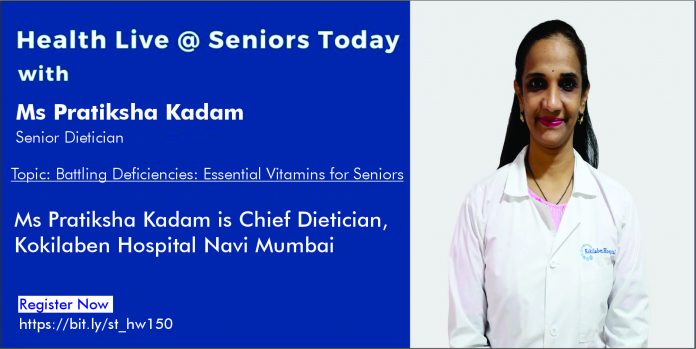About Ms Pratiksha Kadam
Ms Pratiksha Kadam is Chief Dietician at the Kokilaben Dhirubhai Ambani Hospital in Navi Mumbai.She is a Registered Dietitian (RD) from the Indian Dietetics Association and has over 15 years of experience in the field. Ms Kadam has made significant contributions to the field of dietetics and nutrition. Throughout her career, M. Kadam has organised and led several major seminars and conferences. Her notable works include presentations on the effect of garlic on cardiovascular disease, the impact of nutrients on the immune system, and the nutrition status and dietary intake of visually challenged children. She has also explored traditional recipes of Maharashtrians and has contributed to the Asia Intensive Diabetes Management program in 2005. Additionally, Ms Kadam has conducted seminars on special diets for athletes at the Navi Mumbai Sports Association, health and friendly diets at BARC Hospital, and workshops on anaemia at the Satya Sai Baba Trust. With her extensive knowledge and dedication, Ms Kadam continues to make a positive impact on the health and well-being of her patients.
Vit D:
- If you are on any anti seizure medication, corticosteroids/ immunosuppressants, medication for weight loss- a drop in your Vit D levels can also be seen as a side effect of the medication. These medications are also associated with less absorption of Calcium, Phosphorus. And all of this has an effect on your teeth, bones.
- Regular walks and sitting in the sun between 07:00 – 09:00 AM and 04:00 to 06:00 PM helps in the absorption of and formation of Vit D through your skin
- The food sources of Vit D have very little to negligible amount of Vit D. The real source of Vit D is the sunlight.
- If you are healthy enough to exercise/ walk, be sure to do that every morning and evening
- If you cannot exercise/ walk, ensure that you sit in the sun for a little while everyday to ensure a healthy amount of production of Vit D
Vit A:
- Sources: sweet potato, carrot, broccoli, eggs, spinach and other green leafy vegetables, dry apricots, beet, pomegranate
Vit B12:
- The main source of Vit B12 is found in non vegetarian foods, but some vegetarian sources rich in Vit B12 include nuts, dry fruits, peas, peanuts, sprouts and legumes, curd milk, paneer.
- Non vegetarian sources of Vit B12 are shellfish, egg yolk, sea food
Vit B1:
- it is found in legumes, whole grains
Vit B3:
– Found in nuts, fish, shellfish, mushrooms
Vit C:
- Rich sources of Vit C include oranges, amla, lime, lemon
- Amla/ gooseberry is a rich source of Vit C, but we tend to rely on packed amla juice, alma candies, etc. Ms Kadam advises that it’s best to buy the fruits in its original state and consume the fruit immediately after cutting.
- It helps boost your immunity
Anti oxidants:
- Consuming large amounts of outside foods will produce free radicals in your body and those free radicals attack the healthy cells in your body. To save those cells, we need antioxidants
- Large amounts of free radical production is also seen as a result of stress, improper sleep, and outside food.
- Due to this production of free radicals inflammation can be seen, it can result in joint and body pains.
- Sources of antioxidants include- amla, strawberries, oranges, berries, broccoli, green leafy vegetables, unsalted nuts
- Turmeric, curry leaves, garlic leaves can be taken as an antiseptic
- Ginger and tulsi leaves in warm water is helpful as an anti inflammatory
- Pudina, sauf can be used as a dietary substitute for antacid
- To ensure that you receive all the vitamins in adequate amounts, it is advised that you take/ eat/ consume all seasonal fruits and vegetables available in your area during the season.
- Seeds such as flax seeds, pumpkin seeds, chia seeds should be bought from an authentic/ organic ayurvedic shop and consumed as is. At the most you can roast them before eating them but do not add any sugar/ flavour to it.
- You should take 1/4th of a teaspoon everyday
- Avoid taking marketed cereals such as cornflakes, muesli, etc. these cereals invariably have added sugar in them
- The deficiencies in our bodies are not always due to dietary deficiencies, sometimes these deficiencies can also be due to improper digestion and absorption of the vitamins from our intestines.
- To ensure that these are absorbed properly, the gut flora and the flora of the intestines needs to be healthy and for this curd and buttermilk is advised.
- Take adequate amounts of curd and buttermilk. Fresh, room temperature curd is advised, it helps in promoting growth of good bacteria/ flora.
- Other than buttermilk you can also take raw vegetables, soups to help in increasing your gut flora.
- You can keep a jar filled with all kinds of nuts and take a handful of nuts everyday. A handful is more than enough
- Avoid packed fruit juices and even freshly squeezed fruit juices since they have a large amount of sugars. Instead it is advised to consume fruits as is, it will also provide our body with fibres which further facilitates the growth of the good bacteria and pass stools with ease and thereby help avoid constipation
- Buy and consume foods, legumes, rice and whole grains such as wheat, jawahar in its unpolished form
- Intermittent fasting is an old technique that has been followed by our people for generations.
- It is advised to have food from sunrise to sunset and not consume any food after sunset till the next sunrise.
- Take 2- 2.5L of water everyday unless your doctor has advised you to consume less amounts of water, then please follow their advice.








